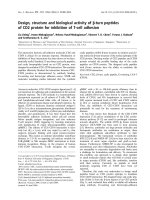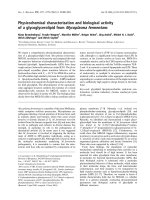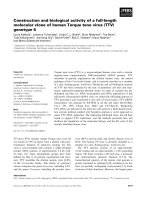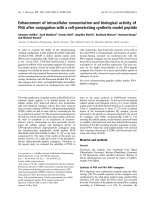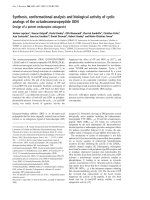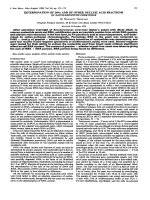Determination of some kinds of important ingeredients of componants and biological activity of Garcinia cowa fruit
Bạn đang xem bản rút gọn của tài liệu. Xem và tải ngay bản đầy đủ của tài liệu tại đây (203.33 KB, 5 trang )
Biotechnology and Seedling
DETERMINATION OF SOME KINDS OF IMPORTANT INGREDIENTS
OF COMPONANTS AND BIOLOGICAL ACTIVITY
OF GARCINIA COWA FRUIT
Nguyen Thi Thu Hang1, Nguyen Van Thanh2, Nguyen Thi Hong Nhung3
1,2,3
Vietnam National University of Forestry
SUMMARY
Tai Chua (Garcinia cowa Roxb.) in the plant family of Clusiaceae was a wealthy medical resource. For the
industrial use in fruit processing, we need to understand the components extracted in Tai Chua and their bioactivity as well. We found that Tai Chua fruits had 90.28 - 93.43% humidity, 3.05 - 4.36% total acids, 3.03 4.34% total orgnanic acids, 0.7 - 0.74% total carbonhydrates, and 57.75 - 64.75 mg/100 g vitamin C. The
extract in ethanol showed the high anti-bactrial effects. Three fruit stages were tested, including the young,
ripen and over-ripen. The ripen fruits had high nutrients, vitamin C, and strong antibactrial activities. So it had
a poten for the production of the foods originated from Tai Chua. The foods would be able to improve
detoxicity, anti-imfamatory, antioxidants, slow aging and immunity.
Keywords: Acorn, antimicrobial activity, biochemical composition, organic acid, vitamin C.
I. INTRODUCTION
Among the parts of the acorn, the fruit is rich
Garcinia cowa Roxb., Family Clusiaceae
in acidity with a sour taste, so it is often used
distributed in India, South Thailand, Vietnam,
as an additive in the food additive, besides, the
Myanmar. In the world, there have been many
fruit is also used as Traditional medicine to
published studies on the pharmacological
detoxify, reduce fever (Sriyatep et al., 2015;
effects of secondary compounds extracted from
Wahyuni et al., 2017). Garcinia cowa, despite
the tree. Garcinia cowa fruit contain high levels
its many uses, is a valuable source of
of flavonoids, phloroglucinol and xanthone,
medicinal herbs that need to be planted and
have anticancer activity, antioxidant, anti-
harvested in a directed manner. However, in
inflammatory, antimicrobial (Hamidi et al.,
our country the harvesting and processing of
2017; Shen et al., 2006). In Vietnam, tilapia can
plant products is only by experience. It has not
be as high as 30 m, distributed more in northern
been standardized both quantitatively and
provinces (Lao Cai, Ha Giang, Vinh Phu, Hoa
qualitatively, so it is difficult to allow the
Binh, Bac Thai, Lang Son), in tropical forests,
production of high quality sourced, high quality
200 - 800 m above sea level, average
yogurt products. Contribute to the creation of
temperature 22 - 260C, rainfall 1,500 - 2,000
scientific basis for the processing of tangerine
mm. In terms of ecological characteristics,
fruits into foods that are nutritious and
acacia is preferred for high humidity but water
detoxifying, increasing immunity and energy for
and weathered soil from sandstone, schist,
the body, publishing scientific information. This
granite or limestone. Acorn is usually grown for
study demonstrates some of the biochemical and
fruit picking, timber, greening, anti-erosion.
biological effects of acorn fruit.
10
JOURNAL OF FORESTRY SCIENCE AND TECHNOLOGY NO. 2 - 2018
Biotechnology and Seedling
II. RESEARCH METHODOLOGY
microorganisms
tested
(Escherichia
coli,
2.1. Research materials
Bacillus subtillis, Aspergillus niger, Pythium,
The fruits of the mature, unprotected trees,
Saccharomyces cerevisiae) by punching and
use three types of fruit: (i) fruit buns (large
measuring the diameter of microbial resistance
size, blue shells, firm fruit and blue-white); (ii)
ring formed around the hole after 72 h Inoculate
ripened fruits (large size, bright yellow shell
microorganisms
and pulp, firm fruit); (iii) ripe berries (large
appropriate temperatures for each type of
size, yellow pods and flesh, soft flesh). Test
microorganism. Data collected were processed
organisms include E. coli, Bacillus subtilis
by Microsoft Excel software to calculate mean,
(Gram), Aspergillus niger, Pythium (root rot),
standard
yeast Saccharomyces cerevisiae.
differences between experimental formulas by
2.2. Research Methods
Determination of amount of water by drying
means
method: Using heat to evaporate water in the
significant different when p < 0.05 (Chu Van
sample. Weigh the sample before and after
Man, 2009).
drying, and then calculate the percentage of
III. RESULTS AND DISCUSSION
water in the sample.
3.1. Results of the determination of amount
on
the
deviation.
of
statistical
environment
Comparison
analysis
of
of
and
data
mean
quantities. The mean values were statistically
acid content, total sugar content, vitamin C
of water of Garcinia cowa fruit
The amount of
water present in the
content by common biochemical methods:
tangerine fruit at three stages (ripening,
total acidity determined by quantitative method
ripening, ripe), as shown in table 1. The results
with an alkaline solution standard; the organic
show that the average moisture content of the
acid content determined by the method of
fruit at the fruit stage 92.56% fresh fruit,
heating the sample to be combined with the
90.28% ripening fruit, 93.43% ripe fruit. The
quantity by a standard alkaline solution;
moisture content valuescorresponding to the
Determine total sugar content by DNS method,
different development periods of Garcinia
use glucose to build up the standard graph;
cowa fruit were statistically analyzed, and the
Determination of vitamin C content by titration
results showed that the difference between the
with Iodine 0.001 N solution (Pham Van Cao,
values was statistically significant. Usually, of
Bui Thi Nhu Thuan, 1991).
the same fruit, the moisture content reflects the
- Analysis of total acid content, total organic
- Determination of antimicrobial activity of
dry matter content in the fruit: the high
the test: Trim the sample of the acorn, soaking
moisture content corresponds to the high water
the sample in 85% ethanol solvent for 30 days.
content and the dry matter content (nutrient
The extract is then filtered and the aqueous
content) is low, and vice versa. Applying this
solution is obtained until it is viscous. Highly
rule in comparison with the dry matter content
diluted with water in a high proportion of 9
of the three fruits, the ripening fruit has the
parts
highest dry matter content, and the ripe fruit
water
is
high
crude
solution.
Determination of activity against five types of
has the lowest dry matter content.
JOURNAL OF FORESTRY SCIENCE AND TECHNOLOGY NO. 2 - 2018
11
Biotechnology and Seedling
Table 1. Amount water at different stages of fruit development
Type of
fruit
Immatrure
Matrure
Over
matrure
Sample
symbol
Weight of
cup (g)
Sample
weight
(g)
Bt1
Bt2
Bt3
Bt4
Bt5
Bt6
Cth1
Cth2
Cth3
Cth4
Cth5
Cth6
Cm1
Cm2
Cm3
Cm4
Cm5
Cm6
30.3587
32.4365
29.7139
31.1056
31.2195
30.9160
32.2430
29.8122
30.3010
30.5056
30.3492
29.9409
31.3740
30.5192
30.9442
31.3459
29.3668
31.0775
10.0065
10.0098
10.0645
10.0005
9.9958
10.0033
9.9987
10.0261
10.0258
10.0343
10.0383
10.0160
10.0074
10.0065
10.0002
9.9991
10.0256
10.0053
Weight of cup and
sample (g)
Before
After
drying
drying
40.3652 31.0969
42.4463 33.1703
39.7784 30.4514
41.1061 31.8603
41.2153 31.9759
40.9193 31.6661
42.2417 33.2163
39.8383 30.8085
40.3268 31.3026
40.5399 31.4638
40.3875 31.3124
39.9569 30.8924
41.3814 32.0250
40.5257 31.1848
40.9444 31.5692
41.3450 32.0188
39.3924 30.0271
41.0828 31.7457
Moisture
(% w/w)
92.6228
92.6692
92.6723
92.4534
92.4328
92.5015
90.2657
90.0629
90.0098
90.4508
90.4047
90.5002
93.4948
93.3483
93.7501
93.2704
93.4139
93.3215
Average
moisture
(% w/w)
92.56b
± 0.10
90.28c
± 0.17
93.43a
± 0.17
Different letters in the same column show statistically significant differences with p < 0.05.
3.2. Analysis of some biochemical
components
In biochemical norms related to the quality of
food (vegetables, fruits), the total acid content of
which contains mainly organic acids and
vitamins plays an important role. The results
showed that the acidity and total organic acids,
total sugar, and vitamin C content of Garcinia
cowa fruit at different stages of development
(Table 2): Total acidity and total organic acids:
Total acids include all organic and inorganic
acids present in the fruit. Normally, in the plant
body, acids usually exist in the form of organic
acids. According to Ritthiwigrom et al. (2013),
acetic acid in the acorn consists mainly of
organic acids such as malic acid, tartaric acid,
acetic acid. Analysis of total acidity and total
organic acids in sour cherries also showed that,
with total acidity as a percentage, when the fruit
12
reached maturity, fruit and fruit ripening was
high (3.05% to 4.36%), which accounts for the
majority of organic acids (3.03% to 4.34%). In
particular, the total acidity and total organic acids
at the ripening stage reached the highest and the
ripening stage was the lowest. Comparing the
organic acidity of the fruit with other nutrientrich fruits, the organic acidity of the highyielding of Garcinia cowa fruit is comparable to
that of apricots, plums, oranges. The total sugar
content in the fruit is low, only 0.7% (fruit cake)
to 0.74% (ripe fruit). Thus, the sugar/acid ratio in
the taurine is low, about 1/6, and that makes the
fruit sour. Vitamin C is also known as ascorbic
acid - an organic acid, and in total organic acids
with vitamin C. However, given the particularly
important role of vitamin C in human and animal
health (increasing immune system, anti-aging,
antioxidant), vitamin C content is determined
JOURNAL OF FORESTRY SCIENCE AND TECHNOLOGY NO. 2 - 2018
Biotechnology and Seedling
separately. The results showed that vitamin C
content in the taurine fruit corresponding to
different stages of development is different. The
vitamin C content in ripe fruits is higher than that
of 64.75 mg/100 g, the fruit is 62.41 mg/100 g,
and the fruit is ripe with 57.75 mg/100 g. In
general, the vitamin C content of the fruit is high,
equivalent to high vitamin C fruits such as
grapefruit, orange, lemon, strawberry. The
results of the study are also consistent with the
publication by Sarma et al. (2014) of the vitamin
C content of tilapia.
Table 2. Some biochemical norms of the fruit in the development stages
Full fruit acid
Organic Acid
Gross Road
Vitamin C
(% w/w)
(% w/w)
(% w/w)
(mg/100 g)
b
b
b
Nine
3.99 ± 0.17
3.97 ± 0.08
0.70 ± 0.03
62.41ab ± 1.82
Nine harvested
4.36a ± 0.19
4.34a ± 0.06
0.73a ± 0.03
64.75a ± 1.34
3.03c ± 0.06
0.74a ± 0.02
57.75b ± 1.37
Nine muzzle
3.05c ± 0.14
Different letters in the same column show statistically significant differences with p < 0.05.
Fruit type
3.3. Results of antimicrobial activity
determination
Screening of antagonistic activity against
microorganisms including bacteria (Bacillus
subtilis, E. coli), mold (Aspergillus niger,
Pythium), yeast (Saccharomyces cerevisiae)
for the three phases of development, there was
a strong activity against all five test organisms,
with the inverse diameter of the extracted juice
when not diluted with each microorganism, as
shown in table 3. The antimicrobial activity of
the extracted sour cherubic extract was
apparent not only with the untreated fruit
extract, but also with 10 times dilution (Figure
1). The results were consistent with the
findings of Jabit et al. (2009), which confirmed
that the fruit was rich in secondary compounds
and resistant to microorganisms.
Table 3. Vitamin C content of Garcinia cowa fruit according to periods of development
Type of fruit
Nine
Nine harvested
Nine muzzle
Diameter of resistance ring (mm)
B. subtilis
E. coli
A. niger
Pythium
S. cerevisiae
3.4 ± 0.05
3.4 ± 0.07
3.2 ± 0.02
3.0 ± 0.02
3.1 ± 0.03
3.0 ± 0.05
4.0 ± 0.01
4.2 ± 0.06
4.2 ± 0.04
2.6 ± 0.02
2.6 ± 0.02
2.5 ± 0.04
2.4 ± 0.01
2.3 ± 0.01
2.3 ± 0.03
(A)
(B)
Fig. 1. Bacillus subtilis (A) and Pythium (B) antimicrobial activity of fruit ripening fruit extracted
at the non-diluted fruit (right) and diluted 10 times (left)
JOURNAL OF FORESTRY SCIENCE AND TECHNOLOGY NO. 2 - 2018
13
Biotechnology and Seedling
IV. CONCLUSION
Garcinia cowa (Tai chua) fruit has an organic
acid content, high vitamin C content and strong
anti-microbial activity. Harvesting of fruit in
matrure for nutrient quality and highest vitamin C
content. It is suitable as a source of natural
ingredients to extract biologically active
substances used in medicine and pharmacy, and
processed into foods rich in nutritional value,
increasing the ability to detoxify and resist
inflammation, antioxidant, anti-aging and
increased immunity for humans and animals.
REFERENCES
1. Chu Van Man (2009). Informatics in
Biotechnology. Education publisher.
2. Hamidi D., Aulia H., Susanti M. (2017). High
performance thin layer chromatography: densitometry
method for determination of rubraxanthone in the stem
bark extract of Garcinia cowa Roxb. Pharmacognosy
Res, 9(3): 230-233.
3. Jabit M. L., Wahyuni F. S., Khalid R., Israf D. A.,
Shaari K., Lajis N. H., Stanslas J. (2009). Cytotoxic and
nitric oxide inhibitory activities of methanol extracts of
Garcinia species. Pharmaceutical Biology, 47(11):
1019-1026.
4. Pham Van Cao, Bui Thi Nhu Thuan (1991). Food
Testing. Hanoi Science and Technology Publishing House.
5. Ritthiwigrom T., Laphookhieo S., Pyne S. G. (2013).
Chemical constituents and biological activities of Garcinia
cowa Roxb. Maejo Int. J. Sci. Technol, 7(2): 212-231.
6. Sarma A., Sarmah P., Kashyap D., Kalita A.
(2014). Evaluation of nutraceutical properties and
antioxidant activity of Garcinia cowa Roxb ex choisy
fruits in Assam (India). World Journal of Pharmacy and
Pharmaceutical Sciences, 3(12): 853-859.
7. Shen J., Tian Z., Yang J. (2006). The constituents
from the stems of Garcinia cowa Roxb, and their
cytotoxic activities. Pharmazie, 62: 549-551.
8. Sriyatep T., Siridechakorn I., Maneerat W.,
Pansanit A., Ritthiwigrom T., Andersen R. J.,
Laphookhieo S. (2015). Bioactive prenylated xanthones
from the young fruits and flowers of Garcinia cowa. J.
Nat. Prod, 78(2): 265-271.
9. Wahyuni F. S., Arisanty D., Hayaty N. F., Juwita
D. A., Almahdy (2017). Sub-acute toxicity study of the
ethyl acetate fraction of Asam Kandis Rinds (Garcinia
cowa Roxb.) on the liver and renal function in mice.
Pharmacogn J., 9(3): 345-349.
10. Wahyuni F. S., Hui L. S., Stanslas J., Lajis N. H.,
Dachriyanus (2017). In vivo study of tetraprenyltoluquinone,
an anticancer compounds from Garcinia cowa Roxb. J
Young Pharm, 9(2): 296-298.
XÁC ĐỊNH THÀNH PHẦN VÀ HOẠT TÍNH SINH HỌC CỦA MỘT SỐ
NHÓM HỢP CHẤT CHÍNH TRONG QUẢ TAI CHUA
Nguyễn Thị Thu Hằng1, Nguyễn Văn Thanh2, Nguyễn Thị Hồng Nhung3
1,2,3
Trường Đại học Lâm nghiệp
TÓM TẮT
Cho đến nay chưa có nhiều nghiên cứu cơ bản về phân tích, đánh giá các giá trị về thành phần hoạt tính sinh
học của quả cây Tai chua (Garcinia cowa fruit). Vì vậy, việc phân tích các thành phần hóa sinh và các hoạt
động sinh học trong quả của G. cowa là tiền đề khoa học cho nghiên cứu tiếp theo cho sản xuất và chế biến sử
dụng các sản phẩm từ G. cowa. Kết quả nghiên cứu cho thấy: hàm lượng nước 90,28 - 93,43%, tổng hàm lượng
axit 3,05 - 4,36%, tổng hàm lượng axit hữu cơ 3,03 - 4,34%, tổng hàm lượng đường 0,70 - 0,74%, nồng độ
vitamin C 57,75 - 64,75 mg/100 g. Chiết xuất ethanol của củ quả G. cowa có hoạt tính kháng khuẩn đáng kể.
Quả cây Tai chua (Garcinia cowa fruit) là một loại trái cây có tuổi thọ cao và có tính kháng khuẩn cao, thích
hợp sử dụng làm nguyên liệu chế biến các thực phẩm chất lượng cao, tăng khả năng giải độc, chống viêm,
chống oxy hóa và gia tăng miễn dịch.
Từ khoá: Axit hữu cơ, hoạt tính kháng khuẩn, quả Tai chua (Garcinia cowa fruit), thành phần sinh hóa,
vitamin C.
Received
Revised
Accepted
14
: 02/3/2018
: 23/3/2018
: 02/4/2018
JOURNAL OF FORESTRY SCIENCE AND TECHNOLOGY NO. 2 - 2018
